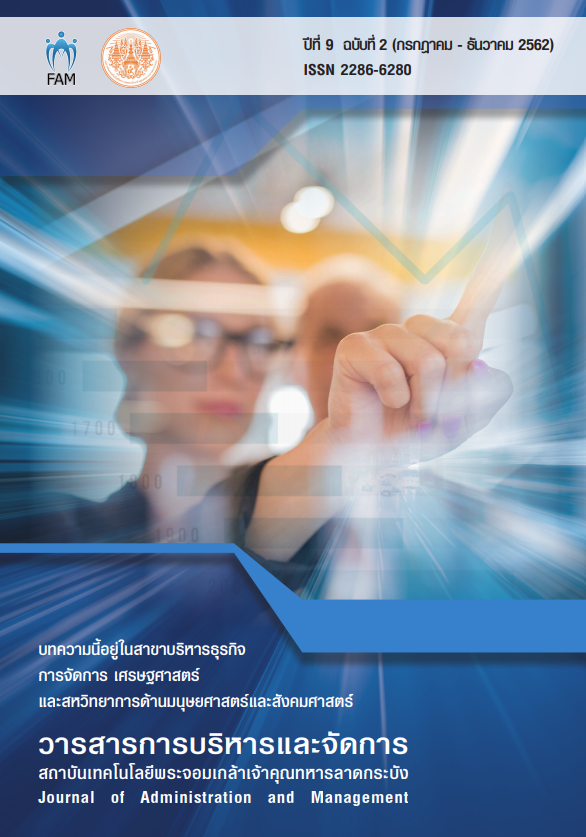The demand of the competency development of staff working in the calibration laboratory
Main Article Content
Abstract
The purposes of this research were to study and to compare the levels of the demand levels of the competency development of staff working in the calibration laboratory received ISO/IEC 17025:2005 certification laboratory in Bangkok classified by personal factors. The samples were 248 people, selected by using the formula of Taro Yamane, with the confidence at 95.5% and error at ±5% (Suthanu Srisai, 2008) The data were collected through the questionnaire. The data were analyzed by percentage, arithmetic mean and standard deviation. Statistics used for hypothesis testing by t-test, One-way ANOVA and LSD.
The results of this research showed that the level of the competency development of staff working in the calibration laboratory. The ranking form the highest to the lowest were knowledge development, personality and skill.
The result of this hypothesis showed that the staff working in the calibration laboratory were different in gender, age, marital status, work experience and joined in ISO/IEC 17025:2005 training were the same demand of the competency development, however the staff with the different levels of education had different demand of the competency development at the statistical level 0.05 and 0.01.
Article Details
Journal of KMITL Business School is available both online and in printed version.
**All articles or opinions presented in this issue of the Journal of KMITL Business School reflect the thoughts of their respective authors. This journal serves as an independent platform for a variety of viewpoints. Authors bear full responsibility for the content of their articles.**
**All articles published in this journal are copyrighted by KMITL Business School, King Mongkut's Institute of Technology Ladkrabang. The editorial team permits copying or using articles, but a reference to the journal is required.**
References
เกศรินทร์ วิริยะอาภรณ์ (2545). ความต้องการในการพัฒนาตนเองของข้าราชการกรมวิชาการกระทรวงศึกษาธิการ. วิทยานิพนธ์ศึกษาศาสตร์มหาบัณฑิต, มหาวิทยาลัยรามคำแหง.
จิราธร โหมดสุวรรณ และจันทนา แสนสุข (2560). ที่ศึกษาปัจจัยที่ส่งผลต่อความต้องการพัฒนาตนเองและความสามารถในการเผชิญฝ่าฟันอุปสรรคของบุคลากรครูศูนย์การศึกษานอกระบบและการศึกษาตามอัธยาศัย (กศน.) กลุ่มลุ่มน้ำเจ้าพระยา. วารสารวิชาการสาขามนุษยศาสตร์ สังคมศาสตร์ และศิลปะ มหาวิทยาลัยศิลปากร.ISSN 1906 – 3431:270-265.
ไชนัญญา มาพุทธ. (2557). ความต้องการพัฒนาทรัพยากรมนุษย์ของพนักงานมหาวิทยาลัยแห่งหนึ่งในภาคตะวันออก เพื่อเข้าสู่การเป็นประชาคมเศรษฐกิจอาเซียน. วิทยานิพนธ์บริหารธุรกิจมหาบัณฑิต, มหาวิทยาลัยบูรพา.
เทื้อน ทองแก้ว (2550). สมรรถนะ( Competency): หลักการและแนวปฏิบัติ.กรุงเทพฯ: มหาวิทยาลัยราชภัฏสวนดุสิต.
บริษัท เทคโนโลยี อินสตรูเมนท์ จำกัด. (2560). ห้องปฏิบัติการสอบเทียบเครื่องมือวัดทางอุตสาหกรรม. [ข้อมูลอิเล็กทรอนิกส์]. สืบค้นเมื่อวันที่ 5 มกราคม 2560 จาก http://www.tic.co.th/index.php?op=calibrations-index.
ปริฉัตร สระทองฮ่วม. (2559). การพัฒนาตนเองของพนักงานสายสนับสนุนวิชาการ มหาวิทยาลัยศิลปากร. วารสารวิทยาการจัดการ มหาวิทยาลัยราชภัฏนครปฐม., Vol.4 No.1, 84-96.
พวงรัตน์ ทวีรัตน์. 2540. วิธีการวิจัยทางพฤติกรรมศาสตร์และสังคมศาสตร์. พิมพ์ครั้งที่ 7.กรุงเทพฯ : สำนักทดสอบทางการศึกษาและจิตวิทยา มหาวิทยาลัยศรีนครินทร์วิโรฒประสานมิตร.
เพ็ญ จะชานรัมย์ และ สุภาวดี ขุนทองจันทร์. (2560.) สมรรถนะของเจ้าหน้าที่ส่งเสริมอุตสาหกรรมด้านการลงทุน ในยุคประชาคมเศรษฐกิจอาเซียนของศูนย์ส่งเสริมอุตสาหกรรม ภาคตะวันออกเฉียงเหนือ. วารสารการจัดการและการพัฒนา มหาวิทยาลัยราชภัฏอุบลราชธานี., Vol.4 No.2, 69-101.
ไพลิน หิรัญ. (2552). ความต้องการการพัฒนาสมรรถนะการทำงานของพนักงาน บริษัทวีจีไอโกลบอลมีเดีย จำกัด. วิทยานิพนธ์วิทยาศาสตร์มหาบัณฑิต, สถาบันเทคโนโลยีพระจอมเกล้าเจ้าคุณทหารลาดกระบัง.
วรารัตน์ เขียวไพรี. (2551). การพัฒนาทรัพยากรมนุษย์ในองค์การ. กรุงเทพฯ : มหาวิทยาลัยราชภัฎธนบุรี.
ศิริชัย พงษ์วิชัย. (2551). การวิเคราะห์ข้อมูลทางสถิติด้วยคอมพิวเตอร์. กรุงเทพฯ:จุฬาลงกรณ์มหาวิทยาลัย.
ศรีแพร ทวิลาภากุล. (2549). การพัฒนาตนเองของข้าราชการ สำนักข่าวกรองแห่งชาติ. วิทยานิพนธ์ศิลปะศาสตร์มหาบัณฑิต, มหาวิทยาลัยเกษตรศาสตร์.
สุกัญญารัศมีธรรมโชติ. (2548). แนวทางการพัฒนาศักยภาพมนุษย์ด้วย Competency. กรุงเทพฯ : ศิริวัฒนาอินเตอรพริ้นทจํากัด (มหาชน).
สุทธนู ศรีไสย์. (2551). สถิติประยุกต์สำหรับงานวิจัยทางสังคมศาสตร์. กรุงเทพฯ: คณะครุศาสตร์ จุฬาลงกรณ์ มหาวิทยาลัย.
โสภณ ช้างกลาง. (2550). ความต้องการพัฒนาตนเองของข้าราชการตำรวจตระเวนชายแดน ระดับชั้นประทวน กองกำกับการตำรวจตระเวนชายแดนที่ 14. วิทยานิพนธ์ศึกษาศาสตร์มหาบัณฑิต, มหาวิทยาลัยรามคำแหง.
McClelland, D. C. (1973). Testing for competence rather than intelligence. American Psychologist, 28(1), 1-14.
Parry, Scott B. (1997) . Evaluating the Impact of Training. Alexandria, Virginia : AmericanSociety for Training and Development.


